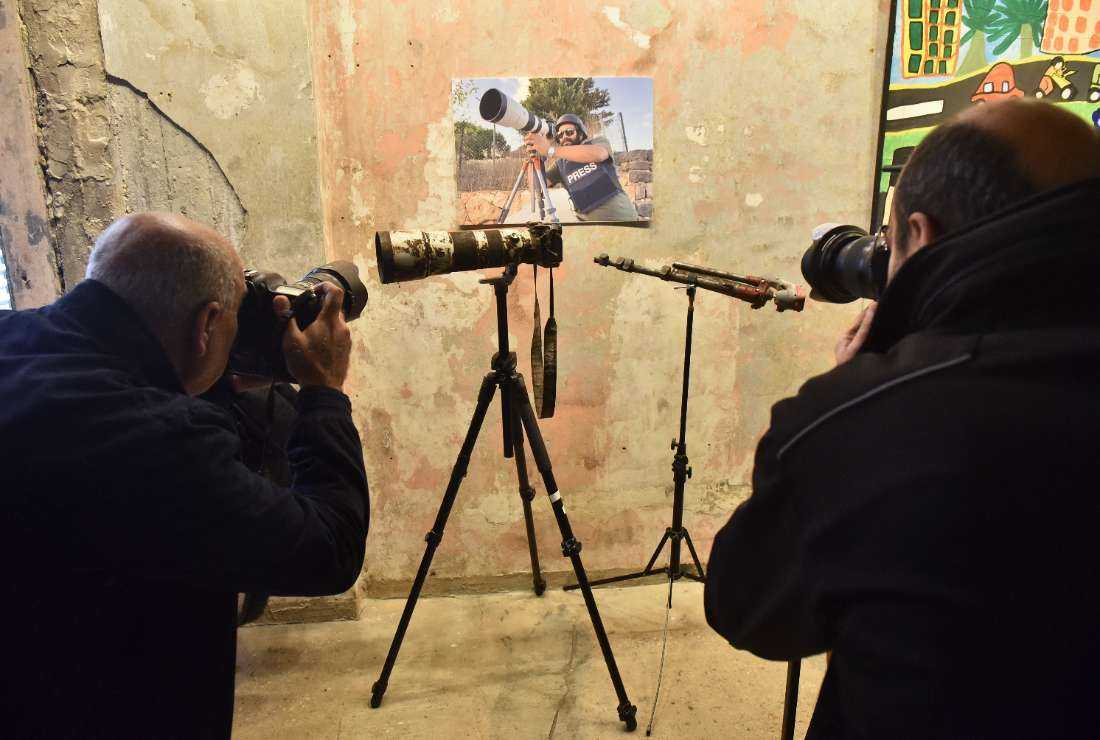
Photographers take pictures of the damaged camera of late Reuters visuals journalist Issam Abdallah (portrait) during a joint press conference by Human Rights Watch and Amnesty International in Beirut on Dec. 7. (Photo: AFP)
The Israeli strike that killed one journalist and wounded six others in Lebanon merits a "war crime" investigation, rights groups Amnesty International and Human Rights Watch told AFP on Thursday.
Reuters journalist Issam Abdallah, 37, was killed instantly in the strike on October 13 in the south of the country near the Israeli border.
The others present -- two more Reuters journalists, two from Al Jazeera, and two from AFP -- were all injured.
AFP photographer Christina Assi, 28, was seriously wounded, later had a leg amputated and is still in hospital.
Independent investigations by both rights groups concluded, like an AFP investigation published earlier on Thursday, that the first strike that killed Abdallah and severely wounded Assi was most likely a tank round fired from Israel.
Amnesty said the strikes "were likely a direct attack on civilians that must be investigated as a war crime".
"Those responsible for Issam Abdallah's unlawful killing and the injuring of six other journalists must be held accountable," said Aya Majzoub, Amnesty's deputy regional director for the Middle East and North Africa.
"No journalist should ever be targeted or killed simply for carrying out their work. Israel must not be allowed to kill and attack journalists with impunity."
HRW said the two Israeli strikes "were apparently deliberate attacks on civilians, which is a war crime".
Under international humanitarian law, "it is forbidden in any circumstances to carry out direct attacks against civilians", it said.
The group's investigation indicated that the journalists were "well removed from ongoing hostilities, clearly identifiable as members of the media, and had been stationary for at least 75 minutes before they were hit".
Amnesty said images it verified showed "the seven journalists were wearing body armor labeled 'press', and that the blue Reuters crew car was marked 'TV' with yellow tape on its hood".
"The evidence strongly suggests that Israeli forces knew or should have known that the group that they were attacking were journalists," HRW's Lebanon researcher Ramzi Kaiss said.
"This is an unlawful and apparently deliberate attack on a very visible group of journalists."
'Justice and accountability'
Speaking at a press conference in Beirut, Dylan Collins, the other AFP journalist wounded in the attack, said: "I know they (the investigations) won't bring Issam back to life. I know they won't help Christina walk again.
"But what I do hope is that they at least will mark the start of some sort of process of justice and accountability."
He shared a message from Assi that said: "We chose journalism with a mission to deliver the truth, and despite the inevitable costs, our commitment remains unwavering. Nothing can silence us."
Lebanese Prime Minister Najib Mikati said in a statement his government would "take all measures to include" the conclusions of the investigation "in the complaint filed before the UN Security Council".
Since the war between Israel and Palestinian militant group Hamas began on October 7, 63 journalists and media workers have been killed -- 56 Palestinians, four Israelis and three Lebanese, the Committee to Protect Journalists says.
The New York-based rights group on Thursday called for "an immediate, independent, and transparent investigation that holds the perpetrators to account" for the strike on journalists in Lebanon.


